We’ve all been there before.
You wake up. Lay in bed for a few minutes before getting up. Check your blood sugar. 115 (6.3 mmol/L) stares back at you.
You smile to yourself: life is good.
Forty minutes later, when you sit down to eat, your blood sugar meter or CGM tells you that you are now at 180 (10 mmol/L)! You have eaten NOTHING. All you’ve done is prepare for the day and prepare food. Now you face the grim potential of chasing your high blood sugars all day long.
What is going on??
Let me explain why your blood sugar sometimes can be high in the morning and what you can do about it
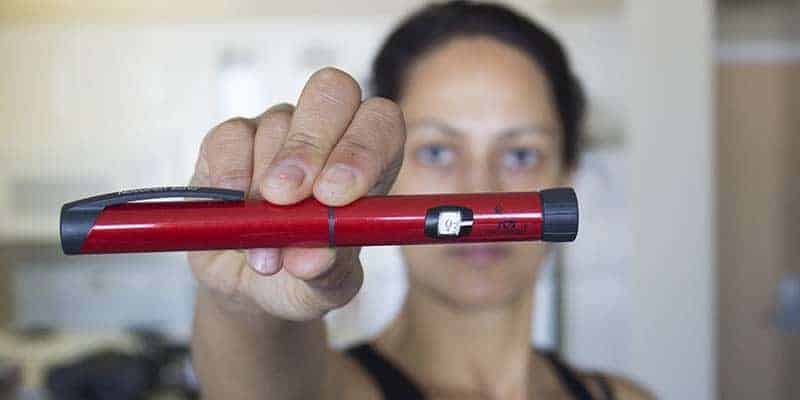
This isn’t Dawn Phenomenon
Many people would blame this rise in blood sugar on dawn phenomenon (DP), which has a similar endpoint, but a different mechanism.
Dawn phenomenon is the result of hormones released in the body in the early morning – predominantly growth hormone, cortisol, epinephrine, and glucagon – which in turn increase insulin resistance. The current basal insulin from the pump or long-acting injections is no longer enough, and blood sugars rise.
That hormonal surge happens around 2 am to 6 am, with most of it occurring in the middle of the night. Let’s say you woke up at 7:30 am and aren’t in the “DP zone.” It’s not DP. Then what?
Feet on the floor
The moment your feet touch the floor as you roll out of bed, you signal to your body, “Hey, I need energy for all the stuff I’m about to do!” Your body recognizes you haven’t eaten in many hours. Your body is also lazy smart and wants the most easily accessible source of energy: the liver.
The liver is the Wal-Mart for stored energy since it’s got everything you need. It stores glycogen that can be easily broken down when fasted or needed for activity, AND is the home of gluconeogenesis, a process where protein is broken down to glucose for energy.
Guess what? You’re fasted AND about to move, which is activity. So, your liver decides to dump glucose into the bloodstream. It will also break down some protein to glucose, but to a much lesser extent.
The cells take up the glucose as much as they can, but you may still be insulin resistant from the night before and from the cortisol dump that occurs each day around 7 am (hence why you may need a greater amount of insulin at breakfast than other meals. Food for thought.)
BAM! Blood glucose levels begin to rise similarly to an amusement park ride – it starts gradually and suddenly gets quicker and quicker. Those of you with CGM may see this.
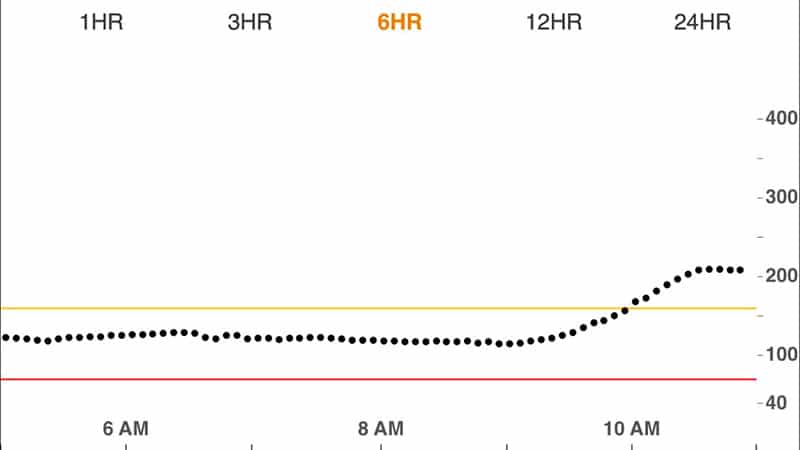
How to prevent high morning blood sugar
Do not fret, friends. There are ways to deal. Here are three simple ways:
1) Take insulin right when you wake up
If it’s 2 pm and you notice your blood sugar is shooting up for no apparent reason, you’d take a correction dose of insulin to prevent that spike, right? (Well, I’d hope so).
The same concept applies here.
To determine how much insulin to take, wake up, record blood sugar values at 30 and 60-minute intervals, and record this for a few days (or use CGM data if you have it). Then, you can use your insulin-to-carb ratio to determine a correction bolus.
2) Increase your basal rate around your wake up time
If you fight Dawn Phenomenon, what’s a common strategy for success? Increasing basal rates in the wee hours of the morning to counteract that hormone-induced spike.
Well, if you’re used to a particular morning routine and know it’ll take you a little while to prepare food and eat, consider increasing that basal rate during that time period. That additional insulin may overcome the liver dumping glucose and blunt your blood sugar spike, or ideally, prevent it in the first place.
3) If you skip breakfast, stop skipping it and EAT SOMETHING
As a registered dietitian, I can regurgitate all the information from the Academy of Nutrition and Dietetics about why breakfast is important. This isn’t about that, but in all honesty here, try eating SOMETHING. I’d love if it were healthy, but if you’re just DYING to have Cinnamon Toast Crunch, by all means, have at it. If you’re about the low-carb life, go for some eggs.
This should, feasibly, prevent an even further increase in blood sugar had you not eaten anything at all and just went about your day.
Pop Quiz: What do these have in common?
If you answered insulin administration, you win!
Insulin, through more biochemistry magic, shuts off the liver glucose output, whether it comes from glycogen breakdown or gluconeogenesis. Thus, the spike should be halted in its tracks. YAY!
Bonus: Just add water!
Let’s pretend you decide to make some Gatorade from powder. It says to add 1 cup of water and mix thoroughly, so you do. You taste it, and it’s WAY too strong and concentrated. You add more water, mix, and now it’s delicious.
SAME THING WITH YOUR BODY.
You wake up in a state of dehydration because you haven’t consumed fluids in hours. Thus, the sugar in your circulation is more concentrated. Even if you wake up to a nice blood sugar, it’s quite possible the liver dump can have an even more accelerated effect because of this, so drinking a glass of water early (or even in bed) may help with this too.
(Also, most people don’t drink enough water each day, so it’s an easy way to sneak some more in)
These strategies should help you get your morning off to a better start, combat those pesky high morning blood sugars, and not allow diabetes to interfere with your plans!
For more actionable tips on preventing high morning blood sugars, watch this video of Diabetes Strong’s founder Christel Oerum explaining the 5 steps she takes to control her morning blood sugars.

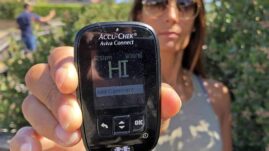
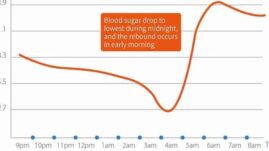
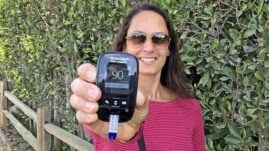
Paulette Thomson
I am in Canada and it would be so much more helpful if you reported blood sugar levels both readings so that we can know immediately and not keep doing calculations for us in Canada
Thanks so much
Also helpful not to use shortened names or abbreviations or first letter of a words
David Akers
If your insulin resistant in the morning like mentioned above, it takes a long time to correct that morning rise. Afrezza seems to work especially well in a short amount of time! I think this would be a great solution. It also has a greater effect on hepatic glucose output (AKA, your Walmart example). Afrezza is an opportunity to combat the rise quickly…
Frans
I recently had a bad flue and was not eating well but drinking about 4 liters of water in 24hrs. I am now well with flu but my sugar is always above 15.i am diabetic, what can be the problem?
Christel Oerum, MS
An infection can impact blood sugars. Maybe see your doctor for blood work.
Libby
Hi 👋 how do I stop my levels going crazy high from midnight every night from midnight they go up and up this morning they were 20.8mml I freaked out had correction but still stay Hight for hours .I drink water all day and though the night . Help
Christel Oerum, MS
If blood sugars continue to go up overnight you might need a long acting insulin or to adjust your dose. This is something you’ll have to discuss with your medical team. There are also different steps we can take to reduce the risk of elevated morning blood sugars. You can see an overview here: https://youtu.be/-O5aRAnn9T0?si=pYiu1q3AwuMjASqL
Roberta
I have morning high bloodsugar and I would like to know what to do. I don’t take insulin. I am in pretty good control with diet and excercise.
Christel Oerum, MS
You might want to discuss additional options with your medical team.
Hildy
I experience the same thing, however, I am on medication not insulin. Will drinking water help too?
Christel Oerum, MS
It could, but it might be something you have to discuss with your doctor.